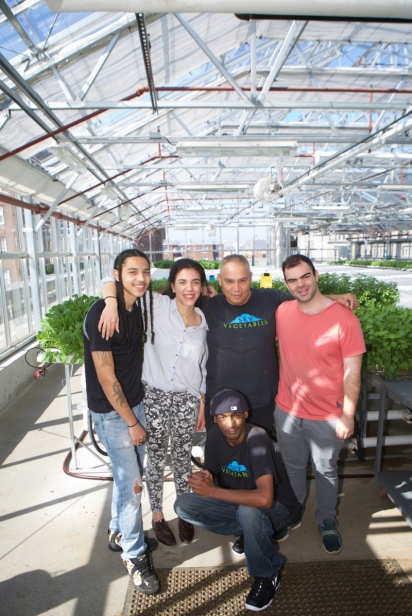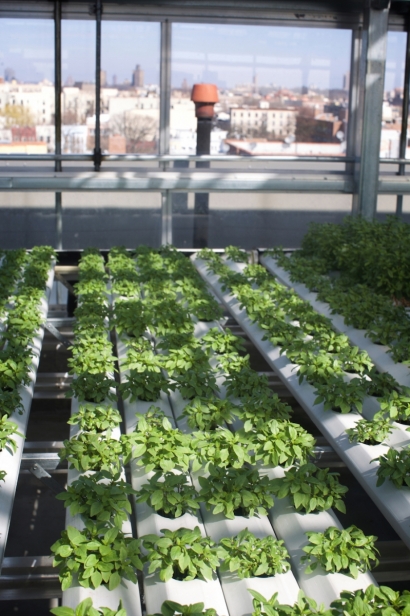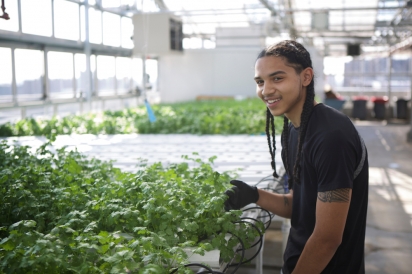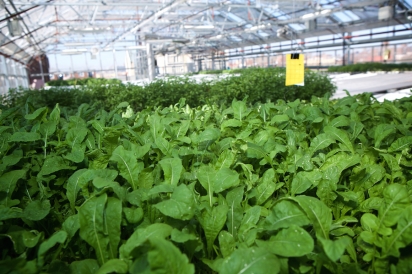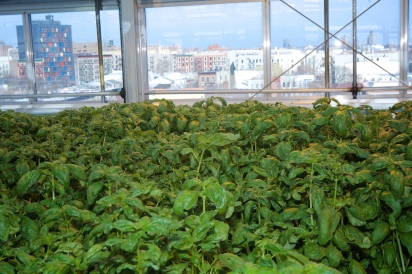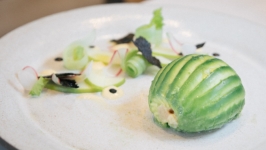A Rooftop Farm Grows Up in the Bronx
High above the towering apartment buildings in the Morrisania neighborhood of the South Bronx, row upon row of leafy greens are rising up. Cilantro sprouting out of white containers, basil glistening in the sun rays, arugula with an incredible view of the city. As many of 10 varieties of leafy greens at any given time.
This is Sky Vegetables, an 8,000-square-foot hydroponic farm perched on top of a Leadership in Energy and Environmental Design (LEED)-certified affordable housing building. Each weekday you can find a small, dedicated team at the rooftop Eden, seeding, transplanting, harvesting, packaging and distributing the greens to FreshDirect, some of the city’s restaurants and once a month to City Harvest.
“I love everything about coming here,” said Assistant Grower Daniel Montero. “The vegetables, the work environment, it’s just a good place.”
It’s a common theme for those who work at Sky Vegetables.
“You’re basically outside in nature,” said Lead Horticulturalist Scott Carrus. “It’s such an amazing thing to get to watch everything growing and end up with this amazing-tasting product.”
It is pretty incredible to stand surrounded by edible greenery, in a warm enclosure with the sun beating down on me, in the city.
In the past 10 years interest in urban, and especially in rooftop, farms has exploded. In New York City alone there are roughly 900 gardens and urban farms, according to the Design Trust for Public Space. All of them are trying to find a way to make fresh, local food more accessible and sustainable while also attempting to solve a problem.
It’s estimated that by 2050 there will be 9 billion people living on the planet and in order to feed them all, we need to double our food production, something that’s not feasible with our current industrial agricultural system. We’re not feeding them now. The South Bronx has the highest rate of food insecurity in the country.
“It really drives me to have this place succeed 100 percent,” said Director of Operations Yara Nagi. “Our aim is to develop the business model of getting enough sustainable customers for this greenhouse so that we have enough money to distribute this food locally on to the neighborhood.”
Sky Vegetables is an attempt at what modern farming can strive to be while also a return to the past. And like all growing organizations, the story of Sky Vegetables is not without its pains.
In all likelihood, the ground Sky Vegetables is built high on top of was once farmland. A Swedish sea captain built the first reported farmstead in the area in the 1600s at what today is East 132 Street and Lincoln Avenue. By the 18th century most of the Morrisania area, owned by the Morris family, was dotted with farmland, leased out to people who ran produce farms, dairies and even cattle farms.
Founded in 2013, Sky Vegetables was built in part as a return to the time when local farms provided food to area. The rooftop greenhouse appears to be the model of a high-tech farm, with its weather system able to control the amount of light and temperature, its pH monitoring and ability to control taste.
“You have the ability to adjust with the shade and the temperature and the nutrients to provide the best product,” Carrus said. “Some people want an arugula really spicy and some people like it a little less spicy and you can work with them to provide the best flavor and the best quality.”
Yet, Carrus reminds me that hydroponics is one of the oldest farming techniques, used by the ancient Egyptians to grow food in the desert. Hydroponics uses recycled rainwater to irrigate the leafy greens in a closed-loop system. The plants absorb the water and the nutrients and what they don’t need is caught in a tank and used again. It’s popular with rooftop farms because it’s lighter than a soil-based farm. More and more places are using hydroponics for vertical farming but with its rooftop location there’s also no need for Sky Vegetables to do that, they have all the natural light they need and the closed-loop system means they have no need for pesticides and they can produce food year-round.
Sky Vegetables was part of the original building plan for the LEED-certified affordable housing building it sits atop. The thought was that in addition to selling leafy greens to restaurants and supermarkets it would provide food directly to the neighborhood through a community-supported agriculture (CSA) program that would help provide a solution to the area’s food desert. Unfortunately, the CSA part of the plan didn’t last long. The logistics of the labor involved to manage people coming into the space and the food safety management made the CSA not successful and it was discontinued.
“We’ve been here and our products have always been great but we need to get more people aware of them,” said Site Manager Juan Rivera. “We’re in touch with a few local places so we’re headed that way.”
Blue Planet Consulting, based out of Brooklyn, employs the on-site Sky Vegetables’ team and has managed the farm since the summer of 2016. The five-person team has increased yields and is working on selling to local restaurants, creating different partnerships within the community and may be educating a new generation of farmers.
“I love it here, transplanting seeds, checking the pH, the right nutrients,” said 19-year-old farm intern Jonathan Betancourt. “It’s been such a learning experience. I want to be a farmer.”



